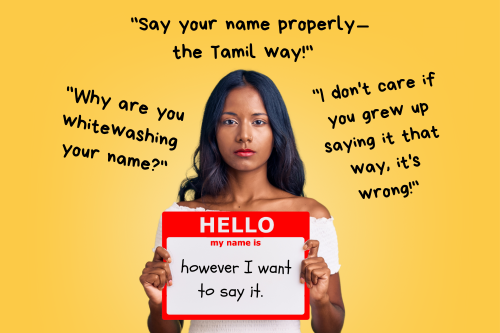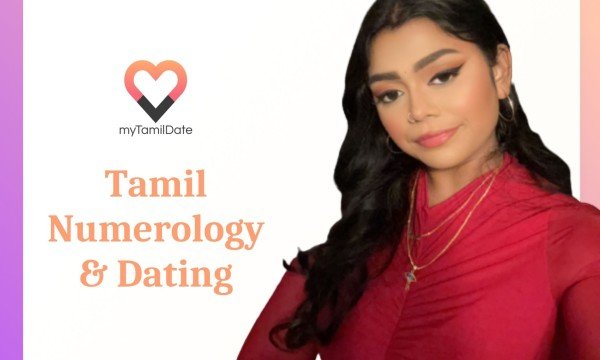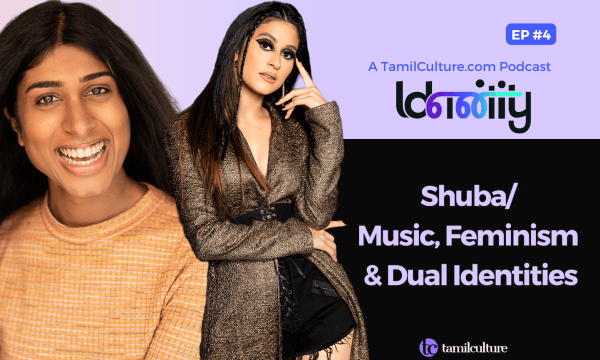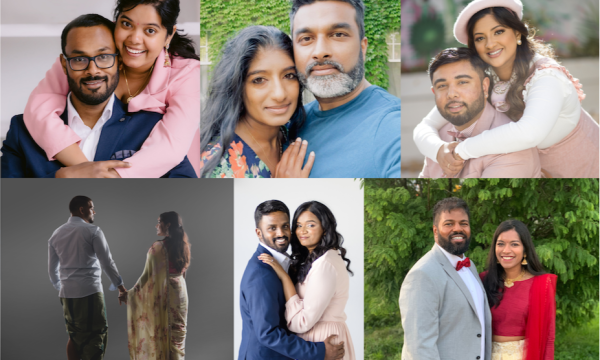
Date on your own terms! Join the other couples who have dated and married through myTamilDate.com!
 An Intro to Tamil Numerology & Dating Meet your myTamilDate numerologist Narthana! This post is all about #1. TamilCulture.com
An Intro to Tamil Numerology & Dating Meet your myTamilDate numerologist Narthana! This post is all about #1. TamilCulture.com I’ve noticed a lot of debate recently about how Tamil and South Asian names are to be pronounced. It doesn’t take a lot of digging on TikTok to see angry comments saying that a name is being pronounced incorrectly, is whitewashed, or that a celebrity is being a disgrace to the South Asian community and to representation.
Anirudh Pisharody, the actor from the third season of Never Have I Ever, was mocked online in 2022 for saying his name in what we would typically call a “whitewashed” way. He responded, doubling down that this was how he preferred to say his name because it is what he had gone by since childhood growing up in America. Remember when Hasan Minhaj corrected Ellen DeGeneres on his name’s pronunciation? In contrast to Pisharody, when Minhaj spoke about the incident later, he doubled down that he preferred to say his name the way his parents pronounce it. It got me thinking, how should South Asian or Tamil names be pronounced? Where do people’s opinions come from, and who gets to decide? “Correct” pronunciation of a name is very important to some, but it’s just as common to hear South Asian names being pronounced differently from their original sound.
Opinions on how names are supposed to be pronounced have a lot to do with identity. Arguments that Tamil names must be pronounced as our parents intended often come back to the idea that not doing so is ruining or diminishing Tamil culture and heritage. Many Tamil names have deep historical meaning, or trace back to ancient literary or religious figures and stories. My name, Lavan, comes from the ancient Sanskrit epic Ramayana, or so I’ve been told. From this perspective, pronouncing my name correctly is a connection to my culture, and I prefer to pronounce it as my parents originally did.
On the other side of this argument, one very important factor that influences how we say our names is where we live. If I had grown up in Sri Lanka, I would probably only ever have known a single way to say my name. But living in both Norway and Canada, the feelings of pride and self-respect were often in conflict with issues like trying to fit in. Kids in Norway had definitely never heard of Ramayana, and most had never heard of Sri Lanka either. My name was so strange to them that trying to correct their pronunciation was usually a back-and-forth conversation that would end with confused looks and a comment like “that’s a weird name”. With the amount of daily bullying and racism I had to deal with, letting them say “Lav-vahn” with a heavy emphasis on the v, became much easier than trying to correct people or giving them another target at which to aim their racist comments. So around Tamil people I introduced myself normally as Lavan (Lovin’ like the McDonald’s slogan), while to everyone else I was “Lav-vahn”.
 Identity Podcast: Shuba/ Music, Feminism and Dual Identities In this episode, Jeevan chats with Shuba, a first generation Indian-American artist fusing the likes of Bollywood into pop-rap gems. TamilCulture.com
Identity Podcast: Shuba/ Music, Feminism and Dual Identities In this episode, Jeevan chats with Shuba, a first generation Indian-American artist fusing the likes of Bollywood into pop-rap gems. TamilCulture.com Catch more episodes of 'Identity'!
- Shakthi / Theatre, Intergenerational Trauma and Australian Tamil Identity
- Identity Podcast: Anuk/ Language, Grief and Tamil Community
- Maral/ Art, Belonging & Armenian-Iraqi-Canadian Identity
When I came to Canada, I continued to introduce myself in two distinct ways to Tamils and non-Tamils, this time with a tweak to suit the ear of Canadians. “Lav-vahn” became “LaVAN (van like the vehicle)”, now with the a extended instead of the v. Saying my name the original way often led to funny moments where people would repeat it back to me to check if they got it right; they'd say “oh, Larry?,” or “LeBron? Nice to meet you.” I’ve also heard Logan, Amal, and Esteban. I guess people will hear what they are most familiar with. Despite the hilarity, it was so much easier to butcher my name on purpose so I didn’t have to do the awkward back and forth dance. I learned to not really care how it was said.
But moving to Canada had a benefit. Scarborough’s massive Tamil population also introduced me to a range of Tamil names and people, and I came across so many different reasons as to why people pronounce their names in so many ways. Some were so used to their name being mispronounced that they didn’t mind it, but would correct people here and there. I met people who simply didn’t like their names in their original pronunciation and therefore pronounced them differently. I also met some people who, because they had grown up speaking English at home, had a bit of trouble pronouncing their names (like rolling the Rs in their names) and therefore said them differently. I met people who had gotten used to and preferred using shortened versions of their names. Others identified strongly with certain pronunciations so much that pronouncing their names in their original form felt less authentic than what they were used to. Others wanted their names pronounced properly in Tamil and did not like any variations. And some, like me, didn’t care much and let people say whatever they wanted. This variation can be seen with celebrities. Maitreyi Ramakrishnan from Never Have I Ever came out some time ago to say she wanted her name pronounced in its original form, and had no intention of shortening it to make it easier to pronounce to non-Tamils. Others may have a short-form, like M.I.A for example, who has gone by “Maya”. There is the comedian Romesh Ranganathan, who pronounces his last name ranga-nay-than and often talks in his routines about the challenges and judgment he got for growing up not being able to speak Tamil.
There are many who may feel that mispronouncing your name leads to the dilution of Tamil culture and identity. And those who want to carry that idea forward should be allowed to do so within themselves, whether that means asking others to say their name in its original form, or upholding other traditions in their personal lives. But the Tamil experience is not a monolith. With names being so closely tied with identity, and as arguably the single most important indicator of who you are, you should be allowed to say them any way you want. Language is always evolving, and while there may be a “proper” way to say a name, pronunciation varies across languages and accents. Pronouncing a name differently does not change its historical meaning or its value, and as just described, there are an endless number of reasons that influence how a person chooses to say their name. Insisting that another person pronounce their name in a specific way is really just a way to force them to conform to your version of what it means to be Tamil – a topic that I have written about before. They are all just as Tamil as everyone else, and should be allowed to be their authentic selves.
Graphic by Sobica Vinayagamoorthy


























